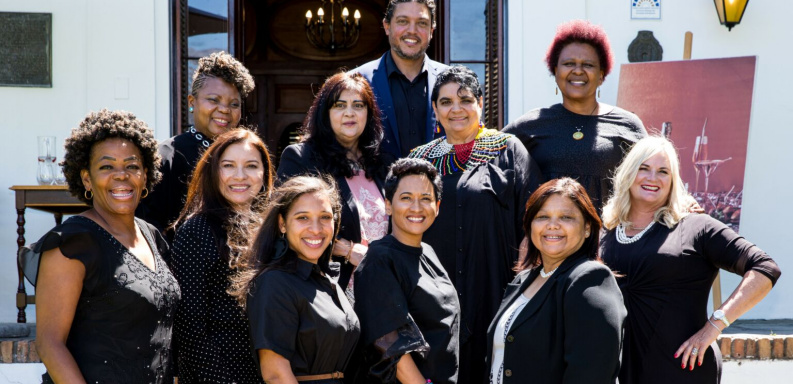The Power and Persistence Represented by The Wine Arc
By Tšepang Molisana | 16th March 2022
The Wine Arc presents an opportunity for the South African wine industry

In 1995, Carmen Stevens made history when she qualified as the first black person and the first black woman to qualify as a winemaker in South Africa.
Initially inspired to study winemaking by the novels she read as a teenager; Carmen’s career has been driven by her passion. She eventually established her own premium wine brand in 2011, Carmen Stevens Wines.
Carmen says that although there were black people who were interested in following a career in winemaking: “before, we, as black people were not allowed to study winemaking.”
While the transition to democracy was a fraught time in South Africa’s social timeline, Carmen’s courage and determination is singular in its reflection of history. In the book and accompanying film, The Colour of Wine, she recounts experiences such as ‘not speaking Afrikaans’ as some of the challenges she faced at Elsenburg College.
The university declined her application twice – in 1990 and 1991 - and the years of study were unparalleled series of racist and biased encounters during the years of transition from apartheid to electoral democracy.
The needle of time has moved forward and Carmen’s enterprising and resilient spirit has shifted forward with it. Over a decade of winemaking and consulting at various properties in South Africa led Carmen to start making her own wine in 2011. In 2019, Carmen Stevens opened her own winery in close proximity to where her winemaking journey had first begun, in Stellenbosch.
She concomitantly founded the Carmen Stevens Foundation which provided over 400 learners with soup in 2011 and currently provides two meals a day for over 10,000 learners from 53 schools.
Carmen Stevens Wines is one of the thirteen businesses that were selected to form part of The Wine Arc for an initial period of two years. The Wine Arc is a South African Wine Industry Transformation Unit (WITU) initiative which opened on 11 November 2021.
The Wine Arc’s thirteen pilot brands include: Aslina Wines, Bayede!, Cape Dreams, Carmen Stevens Wines, Koni Wines, La Ricmal, Libby’s Pride Wines, M’Hudi Wines, Paardenkloof Wines, Ses’fikile Wines, The Bridge of Hope Wines, Tesselaarsdal Wines and Thokozani Wines.
WITU is a Non-Profit Company, incorporated in 2016 by the National Agricultural Marketing Council (NAMC), Vinpro and the South African Liquor Brand Owners Association (SALBA).
Wendy Petersen, operations manager of WITU says: “The (selected) wine brands went through a stringent process of scrutiny on different levels which included commercial, marketing, and technical 360 evaluation to ensure their preparedness for this programme. During the technical evaluation the brands were tasted blind against current competitor products in the market, and the brands rated high during these assessments, emphasizing the quality of the wines which will be presented on this platform.”
South Africa is the largest Fairtrade Producer in the world and there are incredible examples of black engagement throughout the value chain. However, according to Vinpro’s document ‘Transformation and Labour Relations in the South African Wine Industry’, the South African wine industry contributed 4% to the world’s global wine output in 2020. At that time, the industry comprised of over 2,600 brands, about 67 of which were black owned.
Wendy credits limited funding; limited resources as an entrepreneur; a lack of manufacturing assets and infrastructure; market price competitiveness; market access which is a challenge both locally and internationally and economies of scale for the lack of transformation.
“The idea for the Wine Arc came about because we as black-owned brands just could not get shelf space in our own local market, and we do not have brand homes or tasting rooms to showcase our offerings. The Wine Arc is giving these 13 black-owned brands that market space that was not availed to us before,” Carmen explains.
“A brand home will offer the consumers and trade an opportunity to taste these brands and experience the ethnicity associated with the black owned brands. It will also provide credibility and brand awareness to these emerging brands and has the potential to embrace a new inclusive wine culture, something that South Africans can be proud to call their own. The brand home will function as a combined tasting room facility, point of sale facility, and warehouse and distribution facility to some of the emerging black owned brands,” Wendy elaborates.
Wendy says the brands will collectively share a space for hosting tastings with consumers, media, trade partners and government stakeholders.
R12 million worth of infrastructure has been invested in The Wine Arc, which includes: tasting facilities, sensory wine evaluation and training facilities, an outside deck area for events and hosting, a warehousing and distribution center for wines, a meeting area and ecommerce platform.
Wendy says that the Stellenbosch location was selected for various reasons. She says: “standing on the wooden deck of the venue displays the two worlds of the wine industry in perfect harmony. The rich historic wine industry adjacent to the township communities, displays the authencity of South Africa.”
For Carmen, the Wine Arc also represents a platform from which she can share 25 years of experience in the wine industry with her colleagues.
“The Wine Arc will become more than just a home for black-owned brands but can be seen as a symbol of our determination to be recognized for our passion for this industry and to get our offering on the tables of all South Africans - who do not even know about us. The Wine Arc will be the first of many such wine tasting venues around the country where black-owned brands can get (access to) market space. This will give us a footprint that is so needed to cement our names and stake within the industry,” Carmen aspires.
